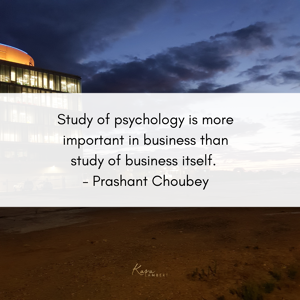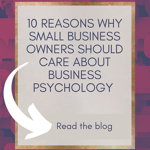When small business owners ask me what I do, they nod when I tell them I am a business psychology consultant. The thing is, that’s not why small business owner should care about business psychology. So I wanted to take a look at how small business owners will use or can benefit from an understanding of business psychology.
When you think about it, any business’ success relies on someone doing something:
– a customer buys
– a lead requests a quote
– sales staff follows up
– marketing staff create content
– accounts staff pay or chase bills
– warehouse staff pack orders
– managers strategise and lead, and
– a small business owner often wears all of these hats (plus some).
Each part a person plays and how they play that role depends on a number of things:
– mood (happy, sad, angry, tired, etc)
– fears
– what they want out of what they are doing (needs, goals)
– stress level
– competing priorities (and how well they handle that).
All of those things are impacted by our mind, by how we think, by the stories we run in our heads, by our psychology. Wherever people are involved, so is our psychology.
Common small business misconceptions about business psychology
Ok so let’s talk about what business psychology isn’t or isn’t just about.
Motivating staff
I did a quick Google about business psychology and most came up with stuff about motivating staff. Nope, it’s not just about that. Oh and don’t get me started about how different that is from Human Resource Management, it’s definitely not that.
Many small business owners are the only staff their business has, or perhaps they have a contractor or two but zero staff. So they believe that business psychology isn’t for them. Nope!
Business psychology can be about motivating staff, but it’s not only about that. Honestly, I’m currently frustrated that even Universities think it’s just about staff. I’m looking to do a Masters in Business Psychology, adding to my psych degree and HR grad cert. I can tell you, I don’t want to learn any more about motivating staff at uni level.
So if you have staff and want to get more out of them, awesome, I can help. If you don’t have staff and think I’m not needed, just hold on and keep reading.
Business psychology is for large corporations
Just because you don’t have a C-Suite, boardroom, or shareholders, doesn’t mean that your business doesn’t crawl with psychology. Even solopreneurs use business psychology; when they talk to clients, when they do discovery calls, when they pitch, when deciding on price, when they write their social media or blogs, when they struggle to get out of their head. It’s all business psychology.
Using psychology is unethical in small business
There’s a misconception that business psychology is solely about manipulating people’s behaviour. In ethical practice, business psychology aims at understanding and positively influencing behaviour, fostering genuine connections with customers, and creating a positive work environment for staff.
I don’t deny that there’s a dark underbelly to business psychology, neuromarketing or the psychology of marketing is quite depressing when you understand how it has been manipulated. However, this is always a choice and it’s quite empowering to know how not to be unethical in psychology in marketing.
Business psychology is only relevant to certain industries
Business psychology principles are applicable across a wide range of industries. Whether a business is in retail, technology, healthcare, or any other sector, understanding the psychology of customers, staff, and yourself at work is crucial for success.
Business psychology is something else I have to know
 Well, not if you use a business psychology consultant, that’s our job. You also don’t need to understand all of the psychology within your small business all at once. To be fair, you shouldn’t because you and your business will change over time and so will the needs.
Well, not if you use a business psychology consultant, that’s our job. You also don’t need to understand all of the psychology within your small business all at once. To be fair, you shouldn’t because you and your business will change over time and so will the needs.
You can dip in and out of sections of business psychology as you need, in fact many of my clients do. You may start with wanting to understand customer psychology online so you can engage more of your audience, then you might realise that you are afraid of posting online and need to work on your mindset, then you might realise that you are working all hours and not having enough time with the family so we talk about customer boundaries, then you might want to raise your prices and talk to me about that, and that goes so well you put on staff and you need help making sure they fit with your business. Yes, all reasons why I have been consulted.
Ways business psychology is used in small business
Ok, so hopefully by now you have some idea of what business psychology is not about, let’s look at some of the things business psychology can help a small business and its owner.
Understand your customer better
Business psychology helps in understanding consumer behaviour, preferences, and decision-making processes. This insight enables small business owners to tailor their products or services to meet the needs and expectations of their target audience.
You see it’s more than developing a client avatar and using that for your marketing. It’s understanding the small nuances that ultimately prevent or lead to a client making a purchase, sending an enquiry, or leaving a review.
More targeted marketing
Knowledge of business psychology allows for the creation of more effective marketing strategies. Small business owners can use psychological principles to craft compelling advertisements, design user-friendly websites, and develop persuasive sales pitches. You can also use psychology to work out what to price your items at. You can work out which target market you should focus on first, next, used to grow a new business or offer. You can use business psychology to work out which social media channel to focus on and how much to post there.
Marketing is about creating a relationship where an exchange of agreed value takes place. (Don’t blame me for the definition, it’s one I’ve been spouting in my Marketing Lectures). Where a business builds trust to the point needed by the client for them to part with the money the business states is necessary to outlay for a product or service. It is the customer’s past experiences, needs, values, goals, fears that determine if they believe that the amount being asked for the product or service is of appropriate value.
Business owners who understand these data points for their customers are able to accurately market their items. Unfortunately, these are things that are commonly missing from traditional client avatar work but are in fact what drives the client behaviour.
Being the boss of the staff
Business psychology is crucial in managing and motivating employees. It helps in understanding what drives employee satisfaction, productivity, and engagement. Applying psychological principles can contribute to creating a positive work environment and fostering a strong team.
If you think back to all the jobs you’ve had, I bet you can remember places where your colleagues were happy (or not) and how motivating that was (or wasn’t). You see, understanding staff psychology & what motivates them gives you the tools to create that happy workplace. Now that happy place, when it was all going well, I bet you were productive and perhaps even went that little further for your boss or your clients. It was your psychology that did that and it can be created in the workplace by leveraging business psychology.
Decision-Making
Small business owners often face tough decisions. Understanding the psychology behind decision-making processes, risk perception, and cognitive biases can help in making more informed and effective decisions. It doesn’t stop there though, some small business owners actually avoid making decisions and understanding why you are one of them and having the skills to change that is another way that psychology helps small businesses.
Fear or Imposter Syndrome in small business owners
Most of us understand that the fight or flight mechanism helped us when faced with saber-toothed tigers and that it isn’t overly helpful since the tigers became extinct. Unfortunately our bodies didn’t get the memo and our fear response has generalised to less life-threatening things. The other part of that is that we now understand that we doo more than fight or run, some of us freeze, and others fawn (or people-please).
Some of you might be surprised that some small business owners find themselves freezing or fawning with regular business activities and stopping their business from being profitable. Curious to know how? Well some business owners:
– don’t open mail
– ghost clients when they have to deliver bad news
– won’t promote their business, even down to posting on social media (and I don’t mean a live video)
– won’t send quotes
– will offer discounts without being asked
– won’t chase overdue payments
These are just a few of the ways fear or imposter syndrome can show up in small businesses. But before you think the only thing you can do is work with a business psychology consultant, then I want to let you know about a couple of resources I have:
– find out what other ways fear turns up in business
– find out which of the 5 most common fears is holding you and your business back
– access this toolkit to start your journey as a fearless business owner.
Adaptability and Resilience
 As a small business owner, you need to be adaptable and resilient. No matter how much strategizing, planning, and risk managing we do, something will always arrive unexpected.
As a small business owner, you need to be adaptable and resilient. No matter how much strategizing, planning, and risk managing we do, something will always arrive unexpected.
Business psychology allows us to understand and use the psychological aspects of change, adaptability, and resilience. This gives us the ability to navigate uncertainties and challenges successfully.
Brand Perception
The perception of a brand is heavily influenced by psychological factors. Small business owners can use business psychology to build and manage a positive brand image, creating trust and loyalty among customers. Some of the ways you can do this is through the colours you use, tone of voice in your communication, how you refer to yourself as the owner or your customers, building a community around your brand, the images and imagery you use, inclusivity, price & value for money/exclusivity.
The key to all of these things is understanding what your ideal client wants to see in their favourite brand and being it, authentically.
Communication Skills
Effective communication is vital in business. Understanding how to communicate with different stakeholders, including customers, employees, and partners, is a key aspect of business psychology.
Psychology is used in communication through understanding our and other’s biases. We use it to control our emotions or respond to theirs. We use psychology to help us formulate responses, and most importantly to ensure we are listening to what they say (not what we want to hear).
It is a core human need to feel heard and understood. The people in your business are no different. When you understand how they like to feel heard and/or understood, then you can have effective communication skills.
Problem-Solving
Small business owners frequently encounter problems and challenges. Business psychology provides tools for creative problem-solving and innovation, encouraging entrepreneurs to think outside the box. This could be creative thinking, critical thinking, or the executive functions of using working memory, organisation, and planning.
Building Relationships
Successful businesses often rely on strong relationships with customers, suppliers, and other stakeholders. Understanding interpersonal dynamics and relationship-building strategies can enhance business success.
Business owners can use these skills in their own networking, building teams with their staff, or maintaining & engaging with their client community, online or face-to-face.
We love to be part of a group, fomo is real, and we buy from people we know (like & trust).
I hope this blog has given you some idea on what business psychology isn’t and how it can help small businesses and owners in growing their business.
Business psychology provides a framework for understanding and navigating the human aspects of business. Small business owners who invest time and effort into grasping these psychological principles are better equipped to make informed decisions, build strong relationships, and create a positive impact on both their customers and employees.
As always, please reach out to me if you have any questions or would like to know more.


